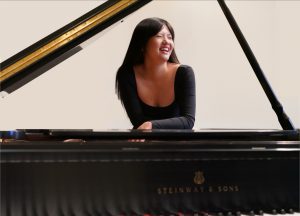
As a child in Utah, Nicole Stankovic knew two things: she loved to play piano, and she wanted to be a doctor when she grew up. Her mother, an immigrant from Taiwan, instilled a love of music in her from a young age. It was only upon beginning the Master of Public Health program at UW that she realized how she could combine those two disparate passions with science and arts degrees. The pandemic, which exposed the need for medical care reform, inspired her to pivot her focus from medical school to public health. Today, Stankovic is pursuing dual master’s degrees in Piano Performance and Public Health, bringing both passions to bear in studying the benefits of music engagement. She commends her professors and mentors, including Dr. Robin McCabe, Dr. Clarence Spigner, Dr. Paul Fishman, Dr. Hendrika Meischke, and Dr. Anne Searcy for fully supporting her every step of the way.
“When I was growing up, I felt like I was dividing my life in half, where I do school, and try to be on top of my science classes, and then I’d come home and do piano in the evenings and on the weekends. It wasn’t really until my master’s program that I realized there’s actually a way to intersect [the two]. I’ve had a lot of fun just exploring that. It feels like my life is finally starting to make sense,” Stankovic said.
Her research involves digging into the literature around music therapy, which has been more heavily studied in Europe and Asia.
“I believe music transports you to another world and reaches parts of the brain other things can’t. Music can unlock memories in people with dementia that they would have otherwise been unable to access. Even for speech and movements, there’s research out there that it helps people walk again and talk again. It’s definitely something that can have amazing results. We don’t quite know why yet because our brain is just so complicated and amazing,” Stankovic said.
Most recently, Stankovic published an op-ed in The Stranger, “Washington Needs Dedicated Funding for Arts Education,” calling for Bill 5878 to receive the funding it needs to succeed. Passed in 2022, Bill 5878 required arts education in public schools starting this school year. Nonetheless, Stankovic spoke with arts educators and administrators who described chronically underfunded programs and music teachers stretched thin. Some teachers divide their limited time and resources between up to nine different schools, resulting in a drastic variance in quality of music education between schools. As Stankovic notes, the esteemed Washington Middle jazz program was saved by a generous donation from jazz icon Quincy Jones, but most programs are not so lucky.

“A lot of times, music is held up by private donations by wealthy individuals who are generous enough with their money to keep us in business, and that’s just not really sustainable. It’s something I feel needs to be solved on a much larger scale, which is why the passing of this bill was so important. We just need those funds from the government to support having a music teacher at every school and making sure that these teachers don’t have to fight to keep these programs alive,” Stankovic explained.
As a piano teacher, Stankovic has seen firsthand the impact music can have on kids’ lives, from providing an outlet for creativity to boosting mental health. She aspires for every kid to have the same access to musical education she had growing up.
“What I’m really passionate about in the public health field is disparities and population health. I’ve always believed in the power of music and the healing power of music, and for my public health thesis I aim to explore whether music is equitably distributed in my backyard,” Stankovic reflected.